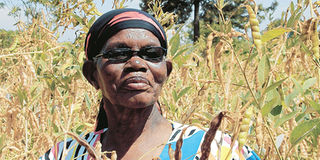New pigeon pea variety boosts food security

Mrs Julia Maringa, 75, stands in her farm in Mbeere district where she has planted the new variety of pigeon peas. Photo/Courtesy of institute.
What you need to know:
- The legumes bred by ICRISAT require little rain, no fertilizer and are drought-tolerant
In the village of Mbita in Mbeere district, Kenya, 65-year-old Eliud Mugo stared solemnly at his four acres of land before speaking. “I have been farming since 1965 and, so far, this year has been the worst,” he said.
Failed rains
This year he planted sorghum, beans and maize but because the rains failed, he only harvested two 90 kg bags of maize instead of the usual seven.
“It rained for only one week this year,” said a dispirited Mr Mugo.
Similar disappointment has engulfed farmer Julia Maringa, 75, in neighbouring Gachoka village. Her biggest concern is no longer pests that destroy crops or even the rising cost of fertiliser; rather, it is the changing climate.
“We used to be able to tell when it was going to rain and for how long. We would then make plans to plant. Nowadays, nobody can tell. We only had rainfall for one week in March instead of a month. It is terrible,” she said.
Maize yield
Mrs Maringa planted cowpeas, maize, millet and pigeon peas on her nine-acre farm. She has managed to educate her nine children and build a modern stone-walled house with the proceeds from her farm.
But things are beginning to look bad; her maize yield this year dropped from 15 90 kg bags to 10.
A few years ago, a 50 kg bag of fertiliser retailed at Sh1,800 but today the same amount sells for Sh3,000. Mrs Maringa has three acres of land under maize that requires 150 kg of fertiliser.
And while this has increased her operating costs enormously, the lack of rainfall is an even bigger problem.
Mr Mugo and Mrs Maringa are among thousands of farmers seeking ways to circumvent the devastating effects of climate change.
And scientists from the International Crop Research Institute for the Semi-Arid Tropics believe they have a solution.
At a recent meeting in Gachoka with about 40 farmers, including Mr Mugo and Mrs Maringa, plant breeders discussed new varieties of the pigeon pea, a legume known as nzuu, mbaazi or njugu in various parts of Kenya.
The institute has warned farmers that a number of crops such as maize and rice, which are staple foods in many parts of Kenya, will continue to produce less as a result of rising temperatures caused by global warming.
The increased temperatures can cause sterility, thus reducing yields.
But the research institute has developed new varieties of pigeon pea through cross- pollination. The new varieties require little rainfall and can survive in semi-arid areas.
“The pigeon peas can tolerate high temperatures, and even in areas where there is inadequate rainfall, they can survive. The crop is deep-rooted and can grow where other crops do not do well,” said Dr Said Silim, regional director for eastern and southern Africa at the crop research institute.
And to Mrs Maringa’s relief, the crop can be grown without fertiliser or pesticides.
The new fast-maturing pigeon pea varieties can be harvested twice a year as the crop matures in three months. In the absence of long rains, the traditional variety produced only a single harvest.
Better income
Mr Mugo has planted the traditional pigeon peas in one section of his farm, but he is more interested in the institute’s variety. “The local variety has not been spared by pests, and it does not do well,” he said.
He received a kilogramme of the new variety seeds last month. And even though Mr Mugo has planted miraa (khat) in another section for which he receives Sh500 a week, he is looking forward to harvesting the new pigeon peas.
“I cannot cook miraa for my children as food, but pigeon peas are food and can be cooked at home,” said Mr Mugo. “And I know pigeon peas will yield a better income.”
The new varieties have proved successful in pilot trials in Makueni district with 80 per cent adoptability to conditions in the region. The plant breeders provide the free seeds for the trials.
In Mbeere, the 40 farmers who expressed interest in the trials are looking forward to harvesting at least a tonne of pigeon peas per acre.
According to Dr Silim, the new varieties can produce three tonnes of pigeon peas for each tonne of the traditional variety.
Two kilogrammes of pigeon peas retail at Sh180.
“There is an urgent need to develop new varieties of crops to cope with the rising temperatures,” Dr Silim said.




